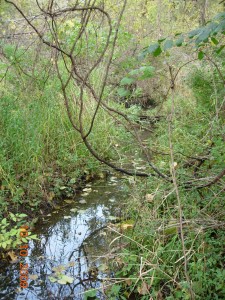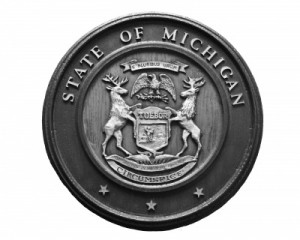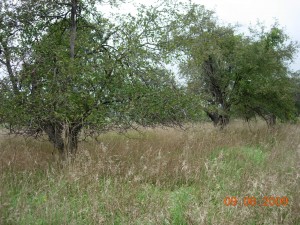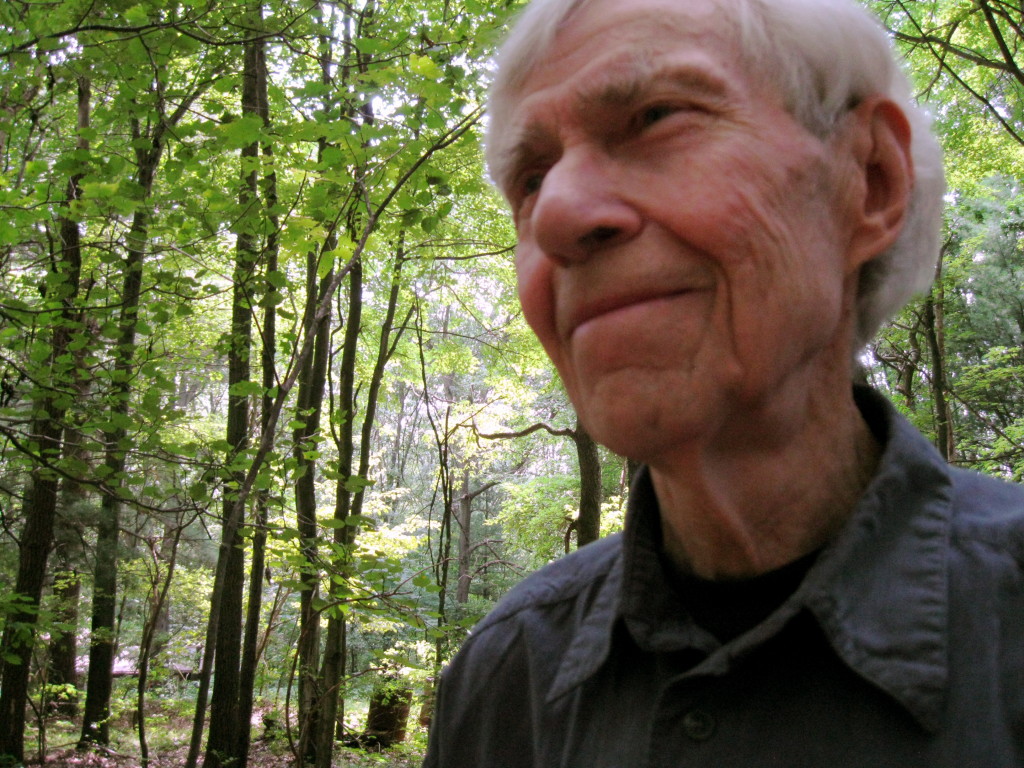 Wednesday afternoon, 30 September 2009, the Appropriations Committee of the Michigan Senate approved the bill that would eliminate the conservation restrictions contained in the original conveyance of the state-owned land called the Colony Farm Orchard to Western Michigan University. That language is “Western Michigan University may utilize the property solely for public park, recreation, or open space purposes, except that the legislature, by statute, may authorize Western Michigan University to utilize the property for some other public purpose.” The bill goes to the full senate, where it is being fast tracked to be taken up at its next session, Tuesday 6 October.
Wednesday afternoon, 30 September 2009, the Appropriations Committee of the Michigan Senate approved the bill that would eliminate the conservation restrictions contained in the original conveyance of the state-owned land called the Colony Farm Orchard to Western Michigan University. That language is “Western Michigan University may utilize the property solely for public park, recreation, or open space purposes, except that the legislature, by statute, may authorize Western Michigan University to utilize the property for some other public purpose.” The bill goes to the full senate, where it is being fast tracked to be taken up at its next session, Tuesday 6 October.
Removing the public purpose restriction will be necessary if WMU is to do what it claims is its goal–to expand its BTR (business, technology, research) park to the Colony Farm Orchard
Within minutes of the vote, WMU’s Senior Vice President for Advancement and Legislative Affairs Gregory Rosine called from Lansing to let the Kalamazoo Gazette know the news.
The story appeared in the Thursday paper, to the consternation of conservationists who have been working to retain the restrictions keeping the land for public purposes. “Outraged” probably best characterizes the reactions of people I’m in contact with. This was not because there had been strong expectations that the bill would be defeated. Since the Appropriations Committee reflects the Senate composition, it contains eleven Republicans and seven Democrats. Many of the arguments against the WMU action are conservation-based, so few Republicans were expected to oppose the bill.
The hope was that the local senator, Tom George, though a Republican, would be swayed by conservation arguments contained in the many letters sent to him and to the Gazette. If he opposed the bill, his colleagues might follow his lead because of his position as the senator from the affected district.
No, the reason for the outrage was that local conservationists expected to be able to attend the Appropriations Committee hearing and make their case for retaining the Orchard, perhaps along with other environmental groups and others who understood the seriousness of the issue. None was able to attend the hearing because the bill was added to the Wednesday agenda without advance notification and passed within the same meeting. The lack of notification extended to the Asylum Lake Preservation Association (ALPA) vice president who had signed up for automatic notification of the bill being placed on the committee agenda. In fact, at 4:55 AM Friday 2 October, the day after the bill had been passed by the Committee, the message from the legislative website update@legislature.mi.gov said of HB 5207, “Last action: 9/21/2009 REFERRED TO COMMITTEE ON APPROPRIATIONS”[caps in original]
One might think that Senator George, having noted the letters from his constituents, might think, “Hey, I bet all these people interested in this Colony Farm Orchard might like me to shoot them an email that it’s now on the agenda.” If he thought that, he didn’t act on the thought.
ALPA, and everyone else, were caught flat-footed. Rumors that the meeting was occurring leaked out on Wednesday afternoon, but few organizations would be able to get to Lansing with persuasive testimony on the spur of the moment, and none did. When I heard such a rumor, I searched every relevant legislative website and found no mention of HB 5207 being taken up by the Appropriations Committee. I checked again the following morning–again,the day after the committee had approved the bill–and found no mention even of a changed agenda, let alone passage.
I have heard of other cases in the Michigan legislature of schedules being set so as to put opponents at a disadvantage. Opponents usually are the other party, but often enough the sides are more complicated; that was the case in the Wednesday afternoon debacle. The quick-snap in football is an acceptable tactic. In government, such goings-on violate American principles of fairness at the most fundamental level.
Businesses, local governments, and many state agencies have strict requirements to provide public notice for virtually any action in which the public or other parties might have an interest. Society functions better as a result. But in the Michigan legislature, there seem to be no penalties–only rewards–for keeping opponents and the public in the dark.
If Senator George read the letters sent to him, he was not swayed. The Gazette article reporting the committee action quoted him as saying that “job creation” was the reason he voted for the bill. He also said the BTR park is “one of the few examples of successful job growth in the city of Kalamazoo and in the state of Michigan, for that matter.”
Few Republicans will vote against job creation no matter what negatives may be attached or how bogus the claim. Few Democrats either, these days. It’s possible that advocates for retaining the Colony Farm Orchard as open space should analyze the BTR jobs claims and other self-congratulatory marketing points. For example, just how many jobs is it that the WMU business park has created?
President John Dunn in his Gazette Viewpoint used a figure of more than 1300, but of these, according to other marketing pieces, 682, a majority, were “indirect salary creation.” I’m not sure what this means, but I don’t think it’s people working shifts at the BTR park. The larger question is, Has the BTR park created any jobs at all? How many of these more than 1300 jobs were already around the area or were jobs that, had the WMU BTR park not been available, would have ended up elsewhere in the county–possibly at a facility set up by private enterprise.
The facts are difficult to get; the overriding fact is that the whole process WMU has followed in pursuing the stripping of the Colony Farm Orchard’s restrictions has been almost fact free. The closest thing to a analysis of the BTR park I’m aware of is an online comment (23 September 2009) of Dunn’s Viewpoint by someone signing himself evadrepus. It’s a good start and deserves wider attention.
The unwillingness to provide facts is part of the general opacity of the whole process. When the question of pros and cons of the Colony Farm Orchard relative to various other obvious options comes up, WMU says…nothing. I have concluded that nothing means, “We will develop the Orchard, because you can’t stop us.” A further translation is that “because you can’t stop us” means “the legislature will let us.”
I had almost reached this conclusion about a month ago. The leaders in and around WMU had concluded that the Colony Farm Orchard was a slam dunk. The economy/jobs argument was compelling, nobody cared about this insignificant sliver of land, it wasn’t being “utilized.” But I still thought that something besides a simple case of hubris must be involved to account for the resoluteness with which the Colony Farm Orchard was being pursued.
The reason I now understand is an obvious one. Money. The land, bought a good many years ago by the state with tax-payer dollars, came to WMU free. But unfortunately it came with a public use restriction. By getting rid of that restriction (which was not a condition of the University Farm property that became the current BTR park), WMU can turn the Orchard into a few lots, perhaps 3-5, and sell them for a total of perhaps $3-$5 million. This is a nice sum, and it’s pure profit.
The same answer explains one of the companion bills that Representative Bob Jones introduced, the one having to do with the former TB sanitarium. Because my main interest in the WMU’s actions has been the protection of conserved land, I haven’t bothered to write about the sanitarium bill. I’ll wait to take it up another time, but it’s an even more clever legal maneuver.
It’s not impossible that the full Senate will reject the lifting of restrictions next Tuesday, as the full senate in 1993 was poised to do.
It’s not impossible that Governor Jennifer Granholm will veto the bill if it reaches her.
If neither of those things happen, then barring litigation, it seems likely that the open space/public use restrictions will disappear. They would have lasted, not the perpetuity that conservationists hope that conservation lands will endure, but about 32 years. This is figuring from the fall of 1977 when the Welborn brothers of Kalamazoo, one a senator, one a representative, added the Orchard to the adjacent Asylum Lake property (conveyed with similar restrictions in 1975) to give WMU the care of 329 acres of dedicated open space.
So, would this be the last go round for the Colony Farm Orchard?
Maybe not.
The loss of the legal restrictions would be a serious loss, making destruction of the Orchard much simpler in the future. But even so, the conservationists and environmentalists of the state may stay in the game. Even if they lose this go round, they may not yet be willing to let their deal go down.

 Wednesday afternoon, 30 September 2009, the Appropriations Committee of the Michigan Senate approved the bill that would eliminate the conservation restrictions contained in the original conveyance of the state-owned land called the Colony Farm Orchard to Western Michigan University. That language is “Western Michigan University may utilize the property solely for public park, recreation, or open space purposes, except that the legislature, by statute, may authorize Western Michigan University to utilize the property for some other public purpose.” The bill goes to the full senate, where it is being fast tracked to be taken up at its next session, Tuesday 6 October.
Wednesday afternoon, 30 September 2009, the Appropriations Committee of the Michigan Senate approved the bill that would eliminate the conservation restrictions contained in the original conveyance of the state-owned land called the Colony Farm Orchard to Western Michigan University. That language is “Western Michigan University may utilize the property solely for public park, recreation, or open space purposes, except that the legislature, by statute, may authorize Western Michigan University to utilize the property for some other public purpose.” The bill goes to the full senate, where it is being fast tracked to be taken up at its next session, Tuesday 6 October.
 On Thursday 17 September 2009, in the Michigan House of Representatives, Robert Jones’s House Bill 5207 was read a second time, placed on third reading, placed on immediate passage, read a third time, passed and given immediate effect (Yeas 105 Nays 2), title amended, and transmitted to the Senate. It all happened fast, though perhaps not as fast as its supporters in the Western Michigan University administration and board have been hoping. Its passage by the House was recorded in the
On Thursday 17 September 2009, in the Michigan House of Representatives, Robert Jones’s House Bill 5207 was read a second time, placed on third reading, placed on immediate passage, read a third time, passed and given immediate effect (Yeas 105 Nays 2), title amended, and transmitted to the Senate. It all happened fast, though perhaps not as fast as its supporters in the Western Michigan University administration and board have been hoping. Its passage by the House was recorded in the 
